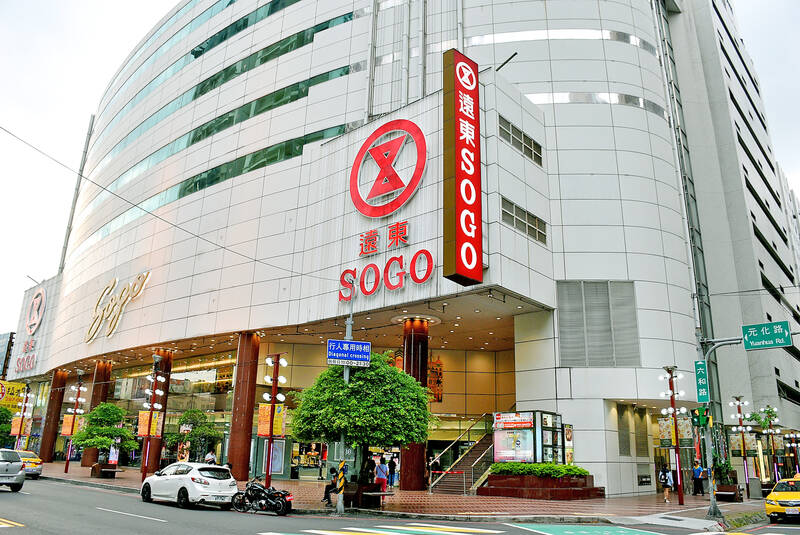Far Eastern Sogo Department Store (遠東SOGO) yesterday said that it would receive a boost in revenue later this year with the partial opening of its retail spaces next to the Taipei Dome (大巨蛋) complex.
Sogo Department Store chairwoman Sophia Huang (黃晴雯) shared the news at the company’s annual general meeting in Taipei, where shareholders approved a plan to distribute a cash dividend of NT$1.26 per share based on last year’s earnings per share of NT$1.69.
SIZE OF THREE STORES

Photo: Lee Jung-ping, Taipei Times
Huang said the “D” section of the new project called Sogo City might start operations in September, along with the Taipei Dome’s soft opening.
The company announced in June last year that it would run the mixed-use complex, which has four sections and a total floor space of 38,000 ping (125,620m2) next to the Taipei Dome.
Sogo City is as large as the three existing Sogo department stores on Zhongxiao E Road, Fuxing S Road and Dunhua S Road combined, Huang said.
Business recruitment was proceeding smoothly and 14 restaurant brands have agreed to open branches in the D section, Huang said, adding that all four sections could begin operating in the first quarter of 2025 and generate an extra NT$10 billion (US$325.52 million) in annual revenue.
LINK BETWEEN DISTRICTS
Sogo City would link Taipei’s Xinyi District (信義) and Daan District (大安), and aims to inject a healthy dose of vitality into the latter, Huang said.
Toward that end, it might have longer operating hours, in conjunction with the 24-hour Eslite Book Store that is to open at Songshan Cultural and Creative Park (松山文創園區), she said, not committing to a 24-hour operation model.
The lease for Sogo Department Store’s relatively small branch on Dunhua S Road is to expire in 2025 and the company has no intention of moving it elsewhere, Huang said, adding that it would invite partners to join Sogo City — her top priority for the time being.

Taiwan Semiconductor Manufacturing Co (TSMC, 台積電) would not produce its most advanced technologies in the US next year, Minister of Economic Affairs J.W. Kuo (郭智輝) said yesterday. Kuo made the comment during an appearance at the legislature, hours after the chipmaker announced that it would invest an additional US$100 billion to expand its manufacturing operations in the US. Asked by Taiwan People’s Party Legislator-at-large Chang Chi-kai (張啟楷) if TSMC would allow its most advanced technologies, the yet-to-be-released 2-nanometer and 1.6-nanometer processes, to go to the US in the near term, Kuo denied it. TSMC recently opened its first US factory, which produces 4-nanometer

PROTECTION: The investigation, which takes aim at exporters such as Canada, Germany and Brazil, came days after Trump unveiled tariff hikes on steel and aluminum products US President Donald Trump on Saturday ordered a probe into potential tariffs on lumber imports — a move threatening to stoke trade tensions — while also pushing for a domestic supply boost. Trump signed an executive order instructing US Secretary of Commerce Howard Lutnick to begin an investigation “to determine the effects on the national security of imports of timber, lumber and their derivative products.” The study might result in new tariffs being imposed, which would pile on top of existing levies. The investigation takes aim at exporters like Canada, Germany and Brazil, with White House officials earlier accusing these economies of

Teleperformance SE, the largest call-center operator in the world, is rolling out an artificial intelligence (AI) system that softens English-speaking Indian workers’ accents in real time in a move the company claims would make them more understandable. The technology, called accent translation, coupled with background noise cancelation, is being deployed in call centers in India, where workers provide customer support to some of Teleperformance’s international clients. The company provides outsourced customer support and content moderation to global companies including Apple Inc, ByteDance Ltd’s (字節跳動) TikTok and Samsung Electronics Co Ltd. “When you have an Indian agent on the line, sometimes it’s hard

PROBE CONTINUES: Those accused falsely represented that the chips would not be transferred to a person other than the authorized end users, court papers said Singapore charged three men with fraud in a case local media have linked to the movement of Nvidia’s advanced chips from the city-state to Chinese artificial intelligence (AI) firm DeepSeek (深度求索). The US is investigating if DeepSeek, the Chinese company whose AI model’s performance rocked the tech world in January, has been using US chips that are not allowed to be shipped to China, Reuters reported earlier. The Singapore case is part of a broader police investigation of 22 individuals and companies suspected of false representation, amid concerns that organized AI chip smuggling to China has been tracked out of nations such